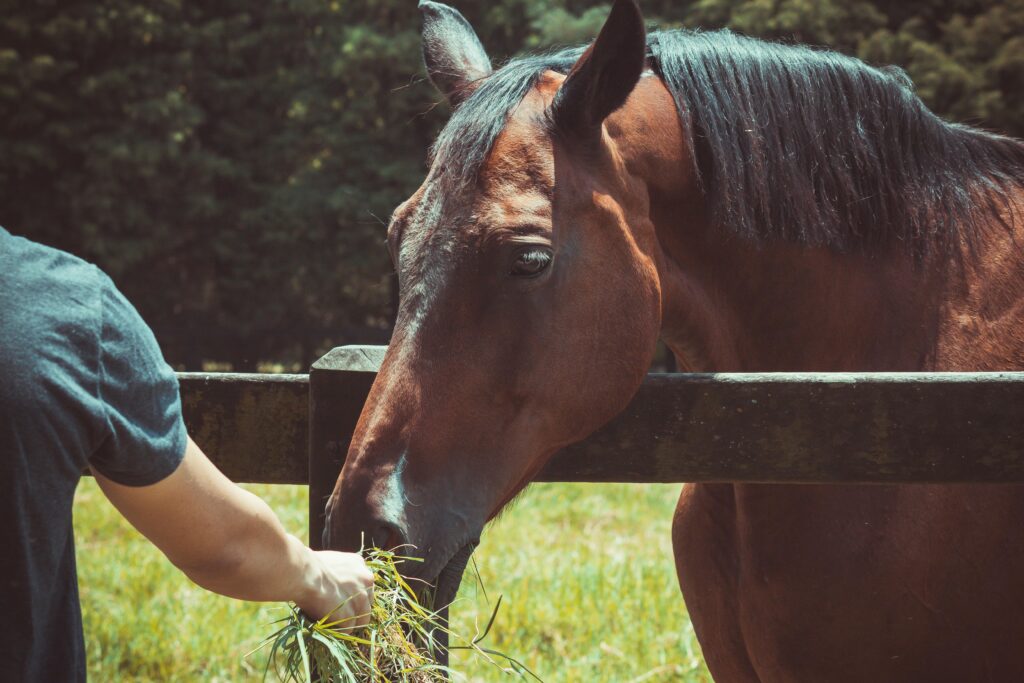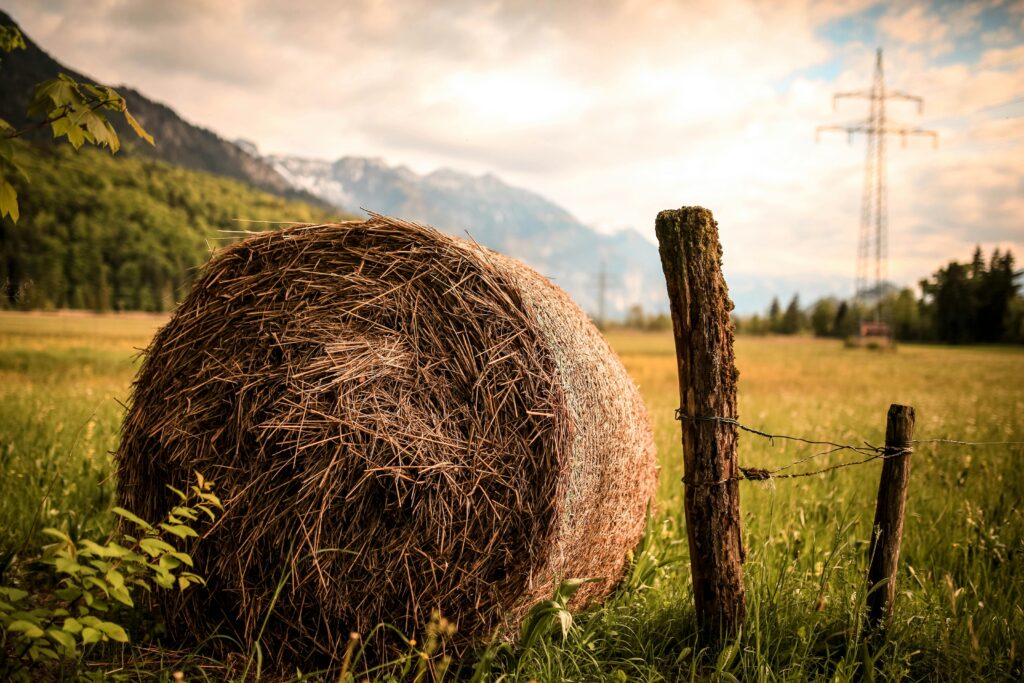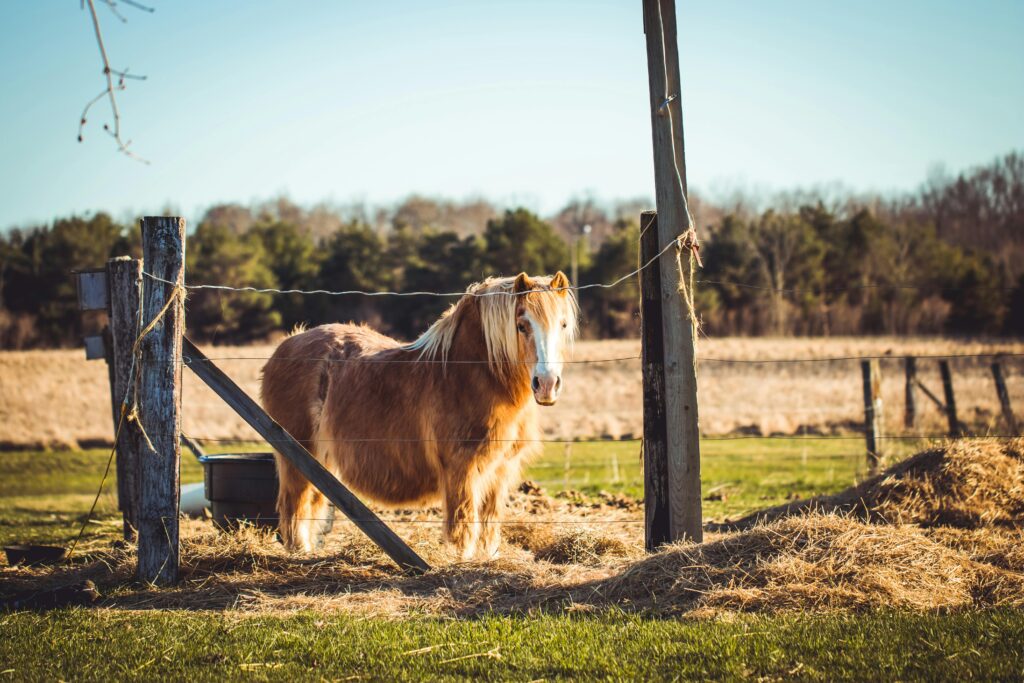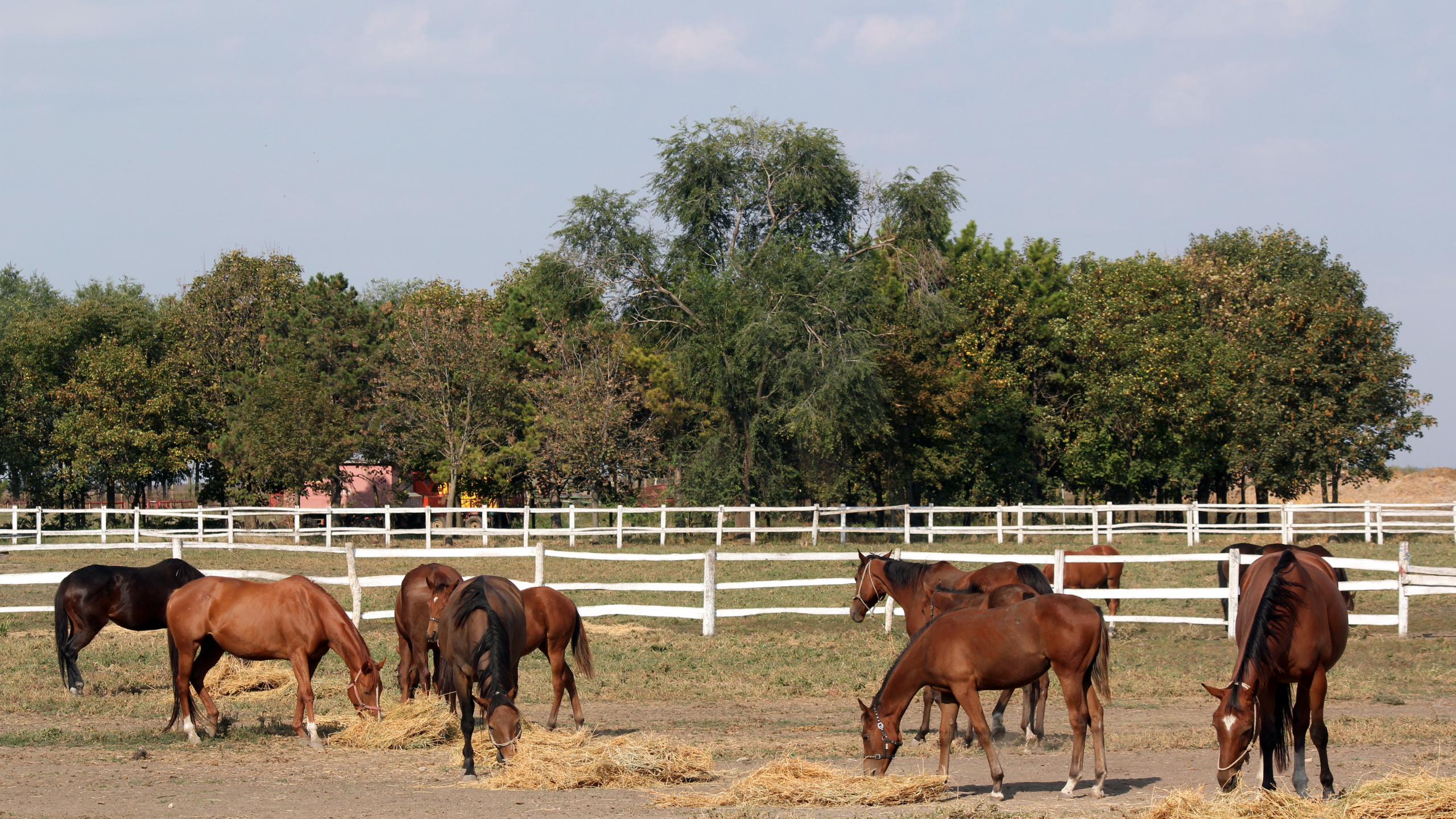Hay is an essential food for horses. It provides them with the nutrients they need to stay happy, healthy, and generally well. When choosing hay for your horse, you should consider their age, weight, activity level, and nutritional requirements.
Choosing the right type can be akin to selecting a fine wine – there’s a variety to suit every palate and purpose. So, let’s dive into the most popular types of horse hay, shall we?

Types of Horse Hay
Timothy Hay
Ahh, Timothy hay, a timeless favorite, renowned for its well-balanced nutritional profile and sometimes referred to be the “Merlot” of horse hays. It is comparable to the dependable, mediocre choice that seldom lets you down. Timothy hay is a mainstay in many stables since it is great for horses of all ages and is relatively low in protein and high in fiber.
Pluses:
- Well-balanced nutrition: Ideal for horses at all life stages, providing a good fiber-to-protein ratio.
- Low in sugar: Great for horses with metabolic issues.
- Palatability: Most horses enjoy the taste, making it a reliable choice.
Minuses:
- Cost: It can be pricier in regions where it’s not locally grown.
- Variability: Quality can vary depending on the cut and season.
Alfalfa Hay
Alfalfa hay, dubbed the “Cabernet” of hay, has a higher protein, calcium, and calorie content, making it richer in taste. It is the preferred option for young horses in the rapid growth phase, lactating mares, and performance horses. But Alfalfa, like a powerful wine not suitable for all palates, must be served in moderation so as not to upset the delicate balance of a horse’s diet.
Pluses:
- Rich in protein, calcium, and vitamins: Excellent for young, growing horses, lactating mares, and high-performance horses.
- Energy-rich: Good for horses needing extra calories.
- Digestibility: Generally easy on the digestive system.
Minuses:
- Too rich for some horses: This can lead to weight gain and may not be suitable for horses with certain health issues.
- Price: Often more expensive than grass hays.
Orchard Grass
Horses adore Orchard Grass because it is mildly sweet and adaptable, much like a good Chardonnay. Its nutritional content is akin to Timothy’s, though it can occasionally be slightly richer depending on the harvest. This hay is suitable for a variety of horses, including competitive athletes and relaxed retirees.
Pluses:
- Taste: Slightly sweeter compared to Timothy, making it more palatable to some horses.
- Nutritional profile: Similar to Timothy but can be a little higher in calories and nutrients.
- Versatility: Suitable for a broad range of horses.
Minuses:
- Inconsistency: Quality and nutritional content can vary widely.
- Availability: May not be as readily available in all areas.
Bermuda Grass
Bermuda Grass is considered the “Sauvignon Blanc” of hays because it is low in calories, light in texture, and easy to store. It is frequently suggested for horses with metabolic problems or those who are prone to gaining weight. Picky eaters love it because of its fine texture….But because it has less protein than other hays, it may need to be combined with a richer hay or supplements to provide balance.
Pluses:
- Low calorie: Ideal for overweight horses.
- Fine texture: Preferred by some picky eaters.
- Good for digestive health: Helps prevent sand colic in areas with sandy soil.
Minuses:
- Lower in protein: May need to be supplemented for more active horses.
- Risk of impaction: The fine texture can lead to impaction colic if not fed properly.
Mixed Hay
Not sure which one to choose, why not mix it up? Mixed Hay is the “blend” of the hay realm, offering a combination of grasses. Most of the time it using a base of Alfalfa to balance nutrition and taste. It’s like a sampling of everything, catering to various nutritional needs and flavor preferences.
Pluses:
- Balanced nutrition: Combines the benefits of many different types of horse hays.
- Palatability: The mix can cater to picky eaters by offering variety.
- Cost-effective: Often less expensive than single-type hays.
Minuses:
- Inconsistent quality: Mixes can vary from batch to batch.
- Nutritional unpredictability: Harder to gauge exact nutritional content.
Clover Hay
The last option is Clover Hay, which tastes sweet and is enticed by horses. It is comparable to a “Pinot Grigio.” It’s rich in nutrients but also comes with a caution label for being a bit too rich, potentially leading to slobbers (excessive drooling) or other issues if not managed carefully.
Before adding clover hay to your horse’s diet, it is a good idea to speak with your veterinarian, particularly if your horse has any underlying medical issues. Always keep in mind that when it comes to feeding your horse, moderation is vital.
Pluses:
- High in nutrients: Rich in protein and minerals.
- Palatable: Sweet taste that horses generally love.
Minuses:
- Potential for health issues: Can cause slobbers or be too rich for some horses, leading to digestive or metabolic problems.
- Mold risk: Clover is more prone to mold, which can cause respiratory and digestive issues.
When choosing the right hay, it’s crucial to weigh these pluses and minuses against your horse’s individual needs, lifestyle, and health status. A balanced approach, sometimes involving a mix of hay types, can often provide the best nutritional and economical solution.

Hay’s Nutritional Advantages
Hay is essential for sustaining health and wellbeing in horses and is considered the foundation of equine nutrition. It offers numerous advantages, each type has a unique nutritional profile that is designed to satisfy the many dietary requirements of horses.
Fiber: The Cornerstone of Digestive Health
Hay contains fiber, which helps to maintain a healthy gut flora and prevent colic by facilitating the easy transit of food through the horse’s digestive tract. Because it encourages satiety, it aids in weight management and is an essential part of any horse’s diet.
Protein and Calcium: Essentials for Strength and Growth
Alfalfa hay is especially good for growing, lactating, or active horses because of its high protein content, which is essential for muscle growth, repair, and general health. Its richness dictates that inactive or overweight horses should only be fed little amounts of it. This type of hay also has a high calcium content, which emphasizes the need of a balanced diet for the health of the skeleton and muscles.
Remember, strong bones and healthy muscles depend on calcium. Strong bones = Strong horses.
Vitamins and Minerals: Supporting Overall Well-being
Hay is a source of essential vitamins and minerals like selenium, magnesium, potassium, and vitamins A, D, and E. These nutrients support various bodily functions, including muscle activity, heart health, vision, and immune system strength. The right hay can provide a balanced diet, ensuring horses remain healthy and active.
The Balanced Equine Diet: A Nutritional Symphony
Choosing the right hay involves matching its nutritional content with the horse’s specific needs, whether for maintenance, growth, or peak performance. A balanced diet that promotes the health and vitality of the horse is just as important as just filling his or her tummy.
In essence, hay is not just roughage but a critical component of equine care, offering a wide range of nutritional benefits. By carefully selecting the type of hay, caretakers can ensure their horses thrive, enjoying good health and high spirits.

What types of hay should I be feeding my horses?
Great question, lets jump right into it.
Horses Age
- Young Horses: Require hay rich in protein and nutrients to support their growth and development, making options like alfalfa beneficial.
- Senior Horses: Might struggle with hay digestion, necessitating softer, more digestible forms such as soaked hay or hay cubes to ease consumption.
The best hays for older horses?
The best hay for older horses often needs to cater to their specific nutritional requirements, which can include a higher need for easily digestible fiber, lower sugar content, and possibly higher protein levels if the horse is having difficulty maintaining muscle mass.
Here are some commonly recommended types of hay for older horses:
- Timothy Hay:
This is a great option for senior horses. It provides a moderate level of protein and is generally well-liked by horses. Additionally, Its high fiber content makes its relatively easy to digest. - Alfalfa Hay:
Higher in protein, calcium, and energy than grass hays, alfalfa can be an excellent choice for older horses, especially those needing to gain weight or those with higher protein requirements. However, because of its higher calorie content, it should be fed in moderation, especially to horses that are prone to obesity or those with metabolic issues. - Orchard Grass Hay:
This is another suitable option for senior horses, offering a balance between nutritional content and digestibility. It’s generally lower in protein than alfalfa but higher than some other grass hays, making it a good middle-ground choice.
Horses Weight
- Overweight Horses: Benefit from lower-calorie grass hay to help manage weight and metabolic issues.
- Underweight Horses: Need higher-calorie hays, such as alfalfa or mixed varieties, to aid in weight gain or sustain energy for rigorous activities.
The best hays for overweight horses?
For overweight horses, the goal is to provide hay that is low in non-structural carbohydrates (NSCs) such as sugars and starches, and high in fiber. This helps manage weight while ensuring the horse still receives adequate nutrition and stays satiated. Here are some of the best options:
- Low-NSC Grass Hays: These are ideal for overweight horses. Timothy, orchard grass, and Bermuda grass hays can have lower NSC levels, particularly if they were cut at a mature stage. It’s important to test the hay for NSC content to ensure it’s truly low in sugars and starches, ideally less than 10-12% NSC.
- Late-Maturity Grass Hays: Hay that is cut at a later stage of growth tends to be higher in fiber and lower in calories and NSCs, making it a good choice for weight management. However, because the fiber is less digestible, it’s crucial to ensure the horse’s gut health can handle the increased fiber load.
- Straw Mixed with Hay: Some owners mix a small amount of straw with their horse’s hay to lower the overall calorie content while still allowing the horse to forage. This should be done cautiously and under veterinary guidance to prevent nutritional deficiencies and ensure the straw is clean and free from contaminants.
Horses Activity Demands
- High-Performance Horses: Those in intensive training or competition require hay with more protein and calories, with alfalfa or mixed hay being excellent choices.
- Less Active Horses: Can maintain health on grass hay, which meets their needs without excess calories or protein.
What is the best hay for performance horses?
For performance horses, the best hay is one that not only supports their elevated nutritional requirements due to rigorous training and competition schedules but also maintains their health and energy levels. Performance horses need a well-balanced diet rich in energy, protein, vitamins, and minerals. The type of hay that best suits a performance horse can depend on the horse’s specific activity level, discipline, and individual health needs, but generally, the following types of hay are considered beneficial:
- Alfalfa Hay:
High in protein, calcium, and energy, alfalfa hay is a popular choice for performance horses. The higher protein content helps in muscle repair and growth, which is crucial for horses in training. Additionally, alfalfa’s higher calorie content can provide the extra energy needed by horses performing strenuous activities. However, because of its richness, it should be fed in balanced quantities to avoid overweight and excessive energy. - Mixed Hays:
A combination of legume (such as alfalfa) and grass hays can offer a well-rounded nutritional profile. Mixing hays allows for adjusting the diet to meet energy, protein, and fiber needs while also helping to mitigate the risk of digestive issues that can occur with a high-alfalfa diet. For example, a mix of alfalfa and Timothy hay is common, balancing the high nutritional value of alfalfa with the moderate energy levels and digestibility of Timothy. - High-Quality Grass Hays:
Grass hays like Timothy, orchard grass, or Bermuda grass, when harvested at their nutritional peak, can also be good for performance horses, especially when a lower-protein or lower-calorie diet is indicated. These hays should be of high quality, meaning they are well-preserved, free of dust and mold, and harvested at the optimal time for nutritional content.
Horses with Special Dietary Needs
- Horses with Special Requirements: Conditions like metabolic disorders necessitate specific dietary considerations. Consulting with a veterinarian or equine nutritionist is crucial to tailor hay choice to these needs.
Remember when Selecting Horse Hay, Quality Counts!
The quality of hay is paramount. Select hay that is free from mold, dust, and contaminants to avoid health risks. Ideal hay is fresh-smelling, green, and devoid of weeds and debris, ensuring safety and nutritional value.
Final Thought
Maintaining your horse’s health and wellbeing requires selecting the ideal hay for them. Consider factors like age, weight, activity level, availability and nutritional needs to choose the right type of hay. Whether it’s grass hay, alfalfa hay, or a mix, make sure it’s of high quality and free from contaminants.




